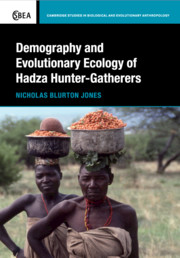Book contents
- Frontmatter
- Contents
- Preface and acknowledgments
- Part I Demography
- Part II Applying the demographic data to interpreting Hadza behavior and biology
- 12 Introduction
- 13 The outcome variables: fertility, child survival, and reproductive success
- 14 Men's and women's reputations as hunters, traders, arrow makers, and diggers
- 15 Marriage
- 16 Another dependent variable: growth as a proxy for fitness
- 17 Inter-birth intervals: a trade-off between fertility and offspring survival?
- 18 Grandmothers as helpers
- 19 Grandmothers and competition between the generations
- 20 Children as helpers
- 21 Husbands and fathers as helpers
- 22 Variation among hunter-gatherers: evolutionary economics of monogamy, male competition, and the sharing ethic
- References
- Index
14 - Men's and women's reputations as hunters, traders, arrow makers, and diggers
from Part II - Applying the demographic data to interpreting Hadza behavior and biology
Published online by Cambridge University Press: 05 January 2016
- Frontmatter
- Contents
- Preface and acknowledgments
- Part I Demography
- Part II Applying the demographic data to interpreting Hadza behavior and biology
- 12 Introduction
- 13 The outcome variables: fertility, child survival, and reproductive success
- 14 Men's and women's reputations as hunters, traders, arrow makers, and diggers
- 15 Marriage
- 16 Another dependent variable: growth as a proxy for fitness
- 17 Inter-birth intervals: a trade-off between fertility and offspring survival?
- 18 Grandmothers as helpers
- 19 Grandmothers and competition between the generations
- 20 Children as helpers
- 21 Husbands and fathers as helpers
- 22 Variation among hunter-gatherers: evolutionary economics of monogamy, male competition, and the sharing ethic
- References
- Index
Summary
Interviewer: “What is men's work?” Hadza woman: “To hunt, and to sit.”
Early in our project, Hawkes found a puzzle in the apparent tendency for Hadza men to specialize in hunting large game. During O'Connell's follows of Hadza men, they seemed to pass by opportunities to take small game. When they took small game, they were as likely to eat it all themselves as to bring any of it back to camp, as described by Woodburn (1968a), Marlowe (2010, p. 120), and Wood and Marlowe (2013, p. 309). They ate honey or berries as they moved through the bush (Photographs 14.1 and 14.2). The men hunted nearly every day but most days came back to camp empty handed. They seemed to target their efforts toward the rare success at hitting something really large, like a zebra or buffalo. The resulting meat mountain was eaten by anyone who turned up, with (as Woodburn has described in 1982 and 1998) the hunter apparently playing little part in the distribution (sometimes he was not even present while others were dividing the carcass and loading up with meat to take back to camp). This seemed like a poor way to feed one's children but a good way to become popular.
To test our impression that men often ignored small game, Hawkes ran an experiment in which she paid men to hunt small game (Hawkes et al., 1991). The men knew how to set traps; all had done this as children, like boys I had observed. As Obst (1912) and Woodburn (1968a, p. 51; 1970, p. 47) had commented, adult Hadza appear not to use traps in the normal course of events. Hawkes found that hunting and trapping small game could provide a daily supply of meat sufficient for a man's household. A daily supply of adequate protein would certainly be better for his children than the occasional feast. An even larger supply of food could be obtained if men brought home honey or plant foods in addition to small game more often. If hunting was a way to provide for wife and children, then big game hunting seemed to be not the best way to set about it.
- Type
- Chapter
- Information
- Demography and Evolutionary Ecology of Hadza Hunter-Gatherers , pp. 262 - 281Publisher: Cambridge University PressPrint publication year: 2016



